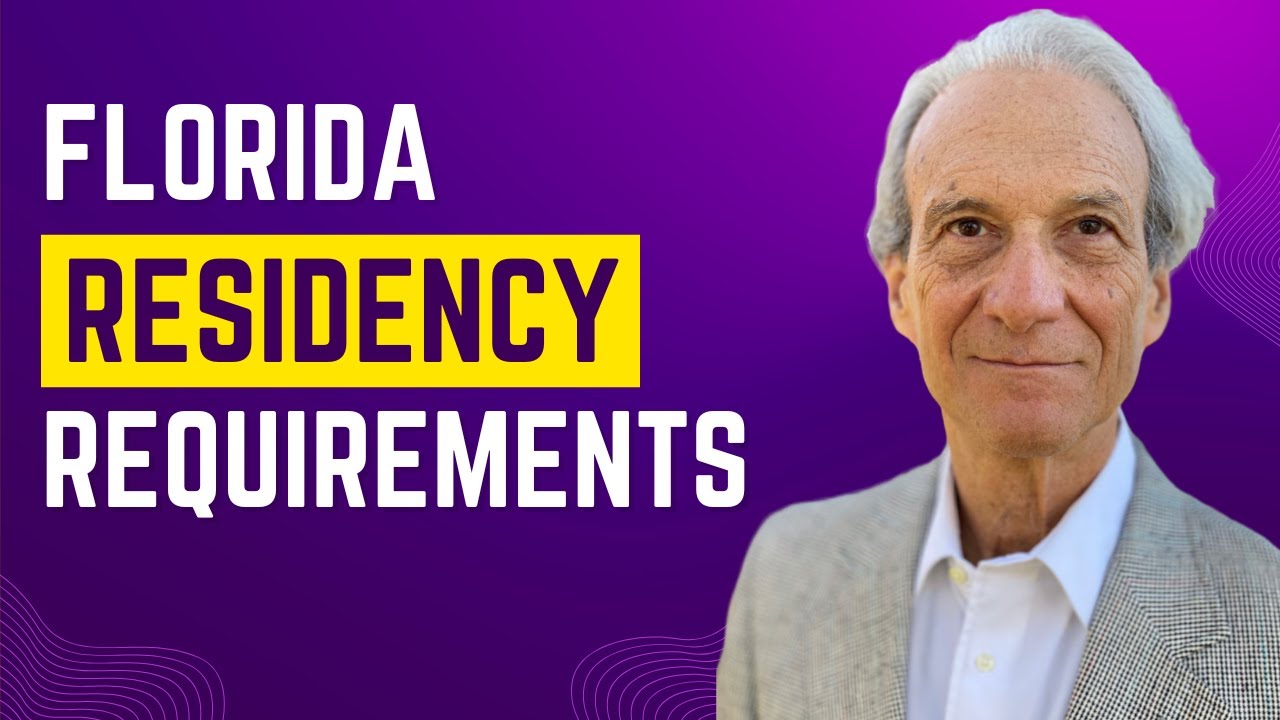Florida Residency Requirements and Steps
What Is Florida Residency?
Florida residency means legally establishing Florida as your permanent home for tax, legal, and personal purposes.
Florida residency benefits include no state income tax, broad asset protection laws, generous homestead exemptions, favorable conditions for estate planning, and eligibility for in-state tuition at public colleges.
Becoming a Florida resident requires living in Florida, obtaining a Florida driver’s license, and registering to vote. You should also file a declaration of domicile and spend at least 183 days per year in the state. These actions prove your intent to make Florida your permanent home for legal and tax purposes.
Steps to Establishing Florida Residency
- Live in Florida for at least 183 days per year.
- Obtain a Florida driver’s license or ID card.
- Register to vote in Florida.
- File a Declaration of Domicile.
- Claim the homestead exemption.
- Use a Florida address on all legal paperwork.
- Physically move valuable household items.
- Maintain a physical mailing address.
Establishing Florida Residency for Tax Purposes
There are special requirements to become a Florida resident for tax purposes. You must:
- Reside in Florida for 183 days per calendar year.
- Maintain a physical presence in Florida most of the year.
- Have a stronger tie to Florida than the previous state.
- Document your residency by updating your driver’s license and voter registration.
The state from which you are moving sets its rules for qualifying for Florida residency to avoid state taxation.
A tax professional in the taxing state can explain the taxing state’s requirements and guidelines for determining whether or not you have become a Florida resident.
We help protect your assets from creditors.
Jon Alper and Gideon Alper are nationally recognized experts in asset protection planning with over 50 years of combined experience. They provide all services remotely by phone or Zoom.

Establishing Florida Residency for Asset Protection Purposes
Only Florida residents can take advantage of Florida’s liberal asset protection laws.
To become a Florida resident for asset protection, there is no minimum number of days you must be in the state. However, owning property is not enough to establish Florida residency for asset protection purposes. The law requires that you demonstrate your intent to establish your primary place of residence in Florida.
When “going home” means you are returning to your residence in Florida, and when your mail is sent to your Florida address, you are probably a Florida resident.
Florida law defines a permanent residence as the place where a person has his or her true, fixed, and permanent home and principal establishment to which, whenever absent, he or she has the intention of returning.

Establishing Florida Residency for In-State Tuition
To qualify as a Florida resident for in-state tuition at public universities, you must establish residency at least 12 months before classes start. Residency requirements for tuition are stricter than those for general residency. You must provide a range of documents to prove you live in Florida, including:
- A Florida driver’s license.
- Lease agreements or property ownership documents.
- Utility bills showing your Florida address.
If you are financially independent and over the age of 24, these documents are sufficient. If you are under 24, your parents must provide similar proof of residency.
You can lose your Florida tuition residency status if you have not lived in the state within the previous 12 months.
Florida Declaration of Domicile
A Florida declaration of domicile is a special affidavit that declares your intent to make Florida your permanent home.
Florida law allows you to demonstrate your intent to become a Florida resident by filing the declaration with the county where you live. It is filed with the Circuit Court and serves as evidence that you intend to remain in Florida indefinitely.
Although a declaration of domicile is a critical part of establishing residency for asset protection or tax purposes, it is not enough on its own. You must also take additional steps, like obtaining a Florida driver’s license, spending most of your time in Florida, and maintaining a Florida address.
The Florida Supreme Court has explained that Florida residency requires not just an intention expressed in a declaration, but also the fact of residency. Good faith intention to be a Florida resident must be accompanied by the overt act of residence.

How Long Does It Take to Become a Florida Resident?
Becoming a Florida resident can take as little as one day after completing key actions like filing a declaration of domicile, obtaining a Florida driver’s license, and registering to vote. For tax apurposes, you must also spend at least 183 days per year in Florida to maintain residency.
Many income tax states use a 183-day rule to establish state residency in Florida.
Under the rule, the taxing states require that a person looking to declare residency in Florida must reside in Florida for at least 183 days (in other words, one day more than six months).
Any time spent in the state can count as a day.
There is no waiting period to establish Florida residency for asset protection purposes. As soon as you form the intent to make Florida your primary home, you are a Florida resident, and you are entitled to Florida’s asset protection benefits.
Asset Protection Advantages for Florida Residency
Florida residency offers major asset protection advantages, including unlimited homestead protection from most creditors, strong protections for retirement accounts, and safeguards for life insurance and annuities. Florida’s generous asset protection laws make it one of the most favorable states for shielding personal wealth from legal claims.
The most well-known protection is the Florida homestead exemption, which protects a person’s homestead from forced sale by a judgment creditor. The homestead exemption is unlimited without any dollar cap. However, there is an acreage limit: 1/2 acre if the property is inside a city and 160 acres if in an unincorporated part of a county.
Florida also provides an expansive version of tenants by entireties, which can protect all types of property owned by a married couple from creditors of a single spouse. Property that can be owned by the entireties includes, for example, bank accounts, real estate, business interests, furniture, and certain equipment.
Florida law presumes that all personal property acquired by a married couple in Florida is tenants by entireties—in most cases, it is up to the creditor to rebut the presumption of entireties ownership.
Finally, Florida statutes exempt the earnings of the head of household, or head of family. Earnings can include wages, salary, commission, or bonus. A head of family is one who provides more than 50% of the financial support for someone they have a moral or legal duty to support (usually an immediate family member).
It is never too late to move to Florida to obtain protection from civil liability. Debtors may legally become Florida residents and protect money invested in a new Florida homestead property even after a money judgment is entered.
There are no civil or criminal penalties for moving to Florida after a creditor files a lawsuit. However, a possible complication exists if another state’s court has issued an injunction against the transfer of assets.

Can You Have Dual Residency?
You cannot be a resident of more than one state under Federal law. You have own property in multiple states, but you can only be officially a resident of one of them.
In some rare situations, a person could be a resident of two states for state income tax purposes. This situation occurs when a person is domiciled in one state, but lives in another state for more than 183 days. This could cause the other state to impose income taxes.
Frequently Asked Questions
What’s the fastest way to become a Florida resident?
The fastest way to become a Florida resident is to establish a permanent home in the state, update your driver’s license, register to vote, and file a Declaration of Domicile with the local county clerk. You must still be physically present in the state for at least 183 days.
Can you keep your out-of-state driver’s license and still be a Florida resident?
Florida law requires new residents to obtain a Florida driver’s license within 30 days of establishing residency. You cannot legally keep your out-of-state license and claim Florida residency. Failure to update your license can result in penalties or legal issues under Florida statutes.
What documents do you need to prove Florida residency?
To prove Florida residency, you need at least two documents, such as a Florida vehicle registration, a Florida driver’s license, a utility bill with your Florida address, a lease agreement, or a property tax bill. Bank statements or government mail with a Florida address are also accepted.
How does becoming a Florida resident affect your taxes?
As a Florida resident, you can benefit from the state’s lack of income tax, which may reduce your overall tax burden depending on your previous state of residence.
Sign up for the latest information.
Get regular updates from our blog, where we discuss asset protection techniques and answer common questions.










